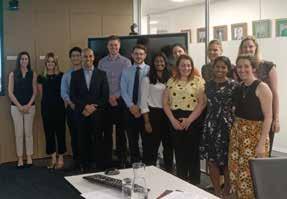
3 minute read
RANZCR: The Impact of a Research Mentor An Interview with Dr Ashu Gupta
The Royal Australian and New Zealand College of Radiologists (RANZCR)
Inside News March 2020
How long have you been a research mentor?
I have been a research mentor for approximately five years.
What motivated you to apply?
I had been supervising radiology registrar projects since I started as a consultant in 2008. Applying for this role was a way of formalising what I had already been doing.
I enjoy research as it adds to clinical practice and provides professional satisfaction. When you look at a radiograph, you’re helping just one person, but when you do research it’s like getting into a helicopter and looking at thousands of patients from up above. It gives you a different perspective and can help you see better ways of doing things, that may improve clinical care and efficiency.
What kind of level of commitment/time does the role require?
This would depend on the structure of the training program (single hospital vs. inter-hospital) and the number of trainees that each individual research mentor might be supervising and the local research culture. The support provided for a research mentor to supervise projects may differ between smaller and larger hospitals. In WA specifically I have good support from my colleagues and the registrars are well informed about the project 1 and 2 processes. I do not have dedicated time for this role and fit it in within my reporting list, catching up with registrars between cases.
What have you learnt from being a research mentor?
Research has highs and lows. There will be times when you look at your data and you will realise that it is incomplete or contaminated by a confounding variable or the ethics application is rejected or requires revision. There will be other times though that you look at the data and realise that it is ground-breaking and could improve clinical practice. Perseverance is important no matter what the project throws at you. The journey can be exciting.
Have there been any challenges or hurdles? If so, how have they been overcome?
I think research is synonymous with challenges and failures.
The first step is to identify a topic. The best research projects are formulated when you’re reporting a film and you don’t quite understand something, so you ask a colleague who doesn’t know the answer either and then you look it up on your computer and even Google doesn’t know. That’s when you know you’ve stumbled across something that could improve clinical practice.
The next step is finding a supervisor to help you, with both the technical skills and soft skills to navigate the project. Subsequently, regulatory approval is required such as through an ethics committee. Having obtained regulatory approval, one needs to conduct the project. Performing or obtaining assistance with statistical analysis can be challenging. When the statistics are complete one needs to write an article for submission or presentation at a conference.
At each one of those steps there can be challenges, but there can also be triumphs along the way.
What have you found most valuable about being a research mentor?
I find supervising projects rewarding. When a registrar encounters a hurdle, there is almost always a solution and it is great to be able to help the registrar to overcome the hurdle.
What has been one of your achievements while being a research mentor?
Within WA, we created a website to match registrars with supervisors and projects which was housed on our training website. Initially we found the website was used well, however given our small community in WA and our training program is networked we found that registrars tended to develop their own contacts. In a larger state though where there are a lot more people and the training is not inter-hospital, this sort of website would be invaluable, particularly for trainees at smaller sites where research opportunities may not be as accessible.
Why should other College members consider becoming a research mentor?
Being a research mentor adds another dimension to your professional life. It provides intellectual challenges and interpersonal challenges in bringing out the best in the registrar and the other people involved in the project. The outcome to all of this is that you are given the opportunity to change how you do things within your department and change clinical practice to provide a better patient outcome.
Dr Ashu Gupta was interviewed by Dr Shoba Ratnagobal of the Royal Perth Hospital
For more information on becoming a research mentor visit www.ranzcr. com/current-opportunities










